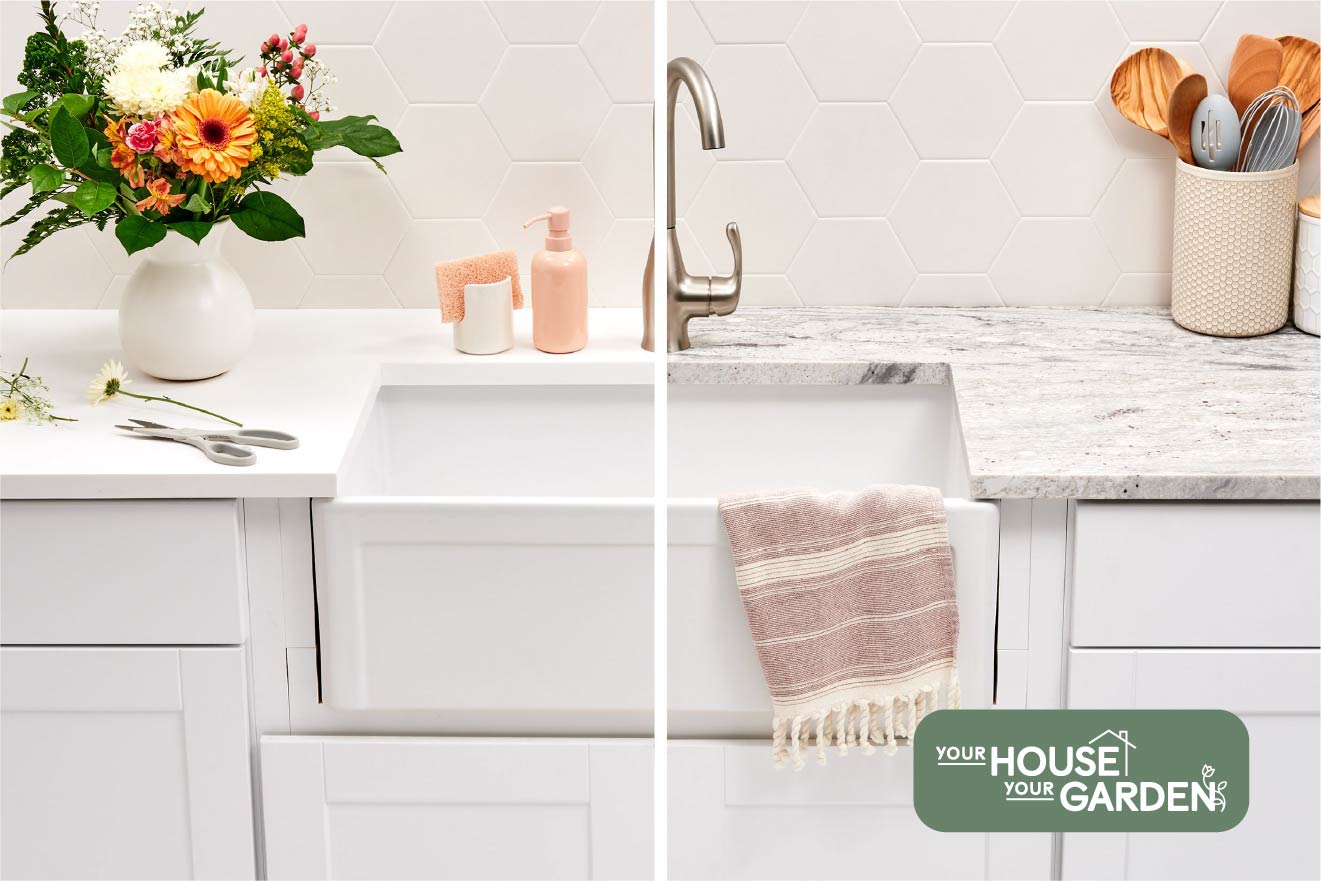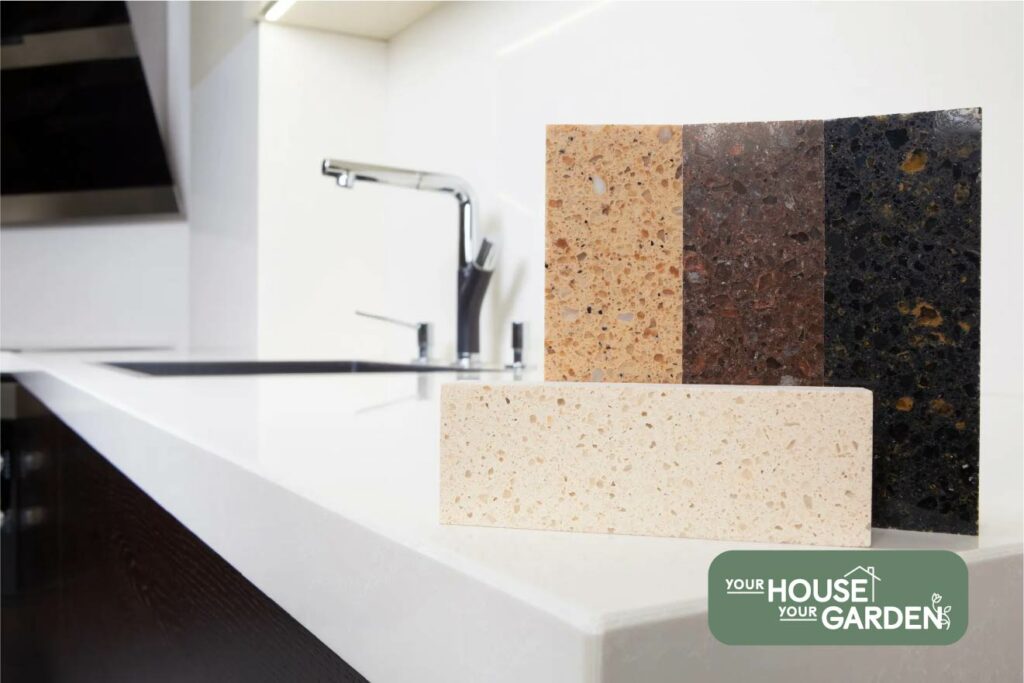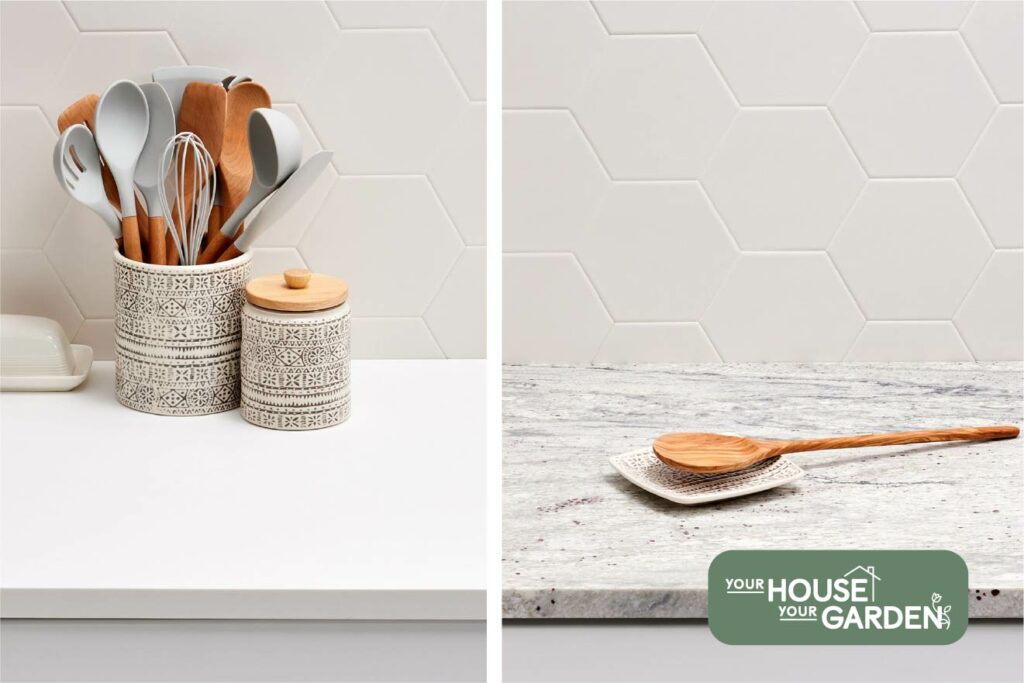Corian vs. Granite Countertops
Home » Home Remodeling » Kitchen Countertops » Corian vs. Granite Countertops
Choosing between natural stone and man-made countertop materials is a big decision to make. Ultimately, this boils down to how much you are willing to invest in kitchen and bathroom counters, the amount of maintenance you can commit to, the budget you have, and your aesthetic goals. After getting to know granite and Corian better, you can make the best decision for your kitchen or bathroom. You can choose what matches your tile flooring or which counter complements the current backsplash in your space.
Corian vs Granite: The Difference
What is Corian?
Solid surfaces, popularly known and also called Corian, are engineered stone materials. Corian was introduced in DuPont in 1971 as a countertop material that mimicked the natural beauty of granite surfaces or marble counters. However, just like quartz counters and laminate countertops, Corian solid surface is man-made. These engineered stone countertops are composed of natural mineral blends and polyester resins for a non-porous slab.
What is Granite?
Granite, on the other hand, is a natural stone surface quarried from the earth’s surface. This igneous rock is formed from hardened magma where the natural rock is quarried, cut by stone fabricators, and placed in your bathroom or kitchen by professional installers. Some homeowners prefer granite surfaces because the natural stone is valuable, made out of 100 natural materials, and granite makes an attractive countertop.

Pros and Cons
To narrow down which surface is best for you, the advantages and disadvantages of each material are discussed: granite vs. Corian:
Corian Countertops: Pros
Non-porous Throughout the Entire Slab: Solid surface countertops are manufactured to be non-porous slabs throughout the entire countertop material. This means that a solid surface countertop is stain-resistant.
Very Affordable Price Point: When you compare Corian to natural stone countertop materials, it is typically more budget-friendly.
Is a Malleable Material: Corian surfaces are known to be very interior design-friendly. If you have countertop surfaces that are curved or more unique shapes compared to their rectangular or square countertop, a solid surface is a great option to consider.
Can be Repaired Easily: A Corian surface is not completely scratch resistant. However, minor scratches from kitchen knives can be sanded down and the solid surface countertop will look as good as new.
Has Endless Designs: Perhaps one of the best things about a Corian countertop is that it has endless designs, colors, patterns, and finishes. If you are looking for more affordable quartz countertops or want a bright and flashy pattern for your bathroom countertop, a solid surface is incredibly versatile.
Easy to Maintain: Solid surface countertops do not require sealing and can be cleaned with warm, soapy water.
Corian Countertops: Cons
Will Be Damaged by Heat: Due to the resins that are in the Corian countertop, solid surfaces will be damaged by a hot pan placed onto the countertop surface without hot pads or hot appliances. High heat will damage a Corian countertop and cause burn marks even though the material has heat resistance up to 212ºF (100ºC.)
Has a Short Life-span Compared to Other Materials: Similar to quartz countertops, Corian solid surface can last up to 10 years with proper maintenance. Compared to a granite slab or marble, this is relatively short.
Is Not As Valuable as Other Options: Keep in mind that Corian is an engineered countertop material. This means that as a bathroom or kitchen countertop, it does not have a high return on investment (ROI.)
Granite Countertops: Pros
Has a Higher Value Compared to Man-made Materials: This natural countertop material is not only more expensive compared to other countertop surfaces, but granite is also more valuable. So you may be investing more money in a granite countertop but this is will increase the value of your home which is beneficial if you are planning to rent it out or sell it in the future.
Easily Repairable: It is fairly easy to repair a granite countertop if it has taken on high temperatures and has been damaged by heat stress or a heavy object. For a maintainable slab, granite can be sanded down and filled with acrylic or epoxy if there are cracks.
Aesthetically Pleasing: Just like all natural stone kitchen countertops, granite counters are beautiful. Granite is made up of so many different minerals that it is the best countertop material for homeowners that are looking for a neutral, light, or dark textured slab.
Sustainable as a Natural Stone: A granite slab is not made out of any synthetic materials or mixed with chemicals which makes it an eco-friendly countertop. Granite does not emit radiation or harmful gasses, is naturally heat-resistant, and can be sealed for extra protection.
Granite Countertops: Cons
Needs to Be Sealed for Maintenance: A granite countertop is porous. This means that you have to seal granite to maintain the material. Due to its natural composition, it can be damaged by acidic materials, acidic foods, and liquids. Sealing granite every 6 months to 12 months can protect it better from heat stress from hot pots and increase its stain resistance.
Typically A Heavy Slab: This kitchen countertop is quite heavy and may require professional installation. Granite bathroom or kitchen countertops will also require more support compared to lighter surfaces (e.g., quartz countertops.)
Has Uncontrollable Patterns: Granite is a busy material and because it is 100% natural, you do not really have a say in how the slab looks. This countertop may seem busy to some homeowners and its patterns and colors can be hard to incorporate into a space.
Limited Colors and Types: The natural colors that a granite surface has is limited to where it is quarried. The same goes for the type of granite a slab is which is why some may prefer engineered materials as they offer more choices.
Comparing the Two
Looking at a granite and Corian countertop at first glance, the latter can actually mimic the former. However, there are key differences in these materials as well:
Maintenance
Both kitchen countertops are easy to maintain. However, Corian is a kitchen countertop that will not require any sealing because it is manufactured. On the other hand, granite, being porous in nature, will need to be sealed upon purchase and then resealed every 6 months to 12 months for maintenance.
Both materials can take on some heat but the resins in a Corian kitchen countertop make it more prone to heat stress. Granite is naturally resistant to heat and can take withstand temperatures to 480ºF (249ºC.) However, it is a good habit to use heat pads in the kitchen and wait until appliances are cool before placing them onto counters.
Durability
Corian is stain-resistant and will last around 10 years with proper care. Stains can be cleaned out with a scouring pad and detergent or cleaner. Granite is a counter that will last at least 30 years with regular sealing and a soap and water cleaning regimen. In terms of durability, Corian vs Granite countertops, granite is the harder and more long-lasting material.
Seams
Corian is nearly seamless and is often chosen over other countertop options because of this reason alone. Granite has more visible seams and it can be more challenging to find a grout that complements the veining patterns and colors of the slab.
Installation
Both Corian and granite can be installed by professionals or as a DIY kitchen remodeling project. However, granite tends to have more weight and is the more expensive option which is why it is not as easy to install by yourself.
Aesthetic
Corian is man-made and can be manufactured to fit or complement any interior design style. For those with unique light fixtures or custom kitchen cabinets, Corian comes in every color, pattern, and finish you can think of. Granite, as a natural material, has a limited spectrum of patterns and colors. Some homeowners may prefer having a unique countertop which is why they may gravitate towards the beauty of granite instead.
Return on Investment
Corian costs less than granite which is why it has a lower ROI. Solid surface countertops will cost $40 to $45 per square foot while granite will cost $40 to $100 per square foot. Corian vs granite counters, granite is the countertop material that will increase the value of a bathroom or kitchen. Each counter is unique and has its own mineral makeup that shows in its one-of-a-kind pattern and color. Granite countertops are more of an investment compared to Corian countertops but will give back more as well.


